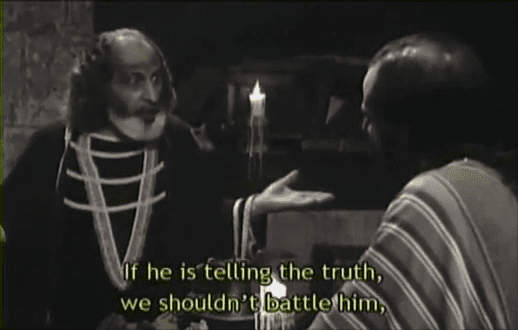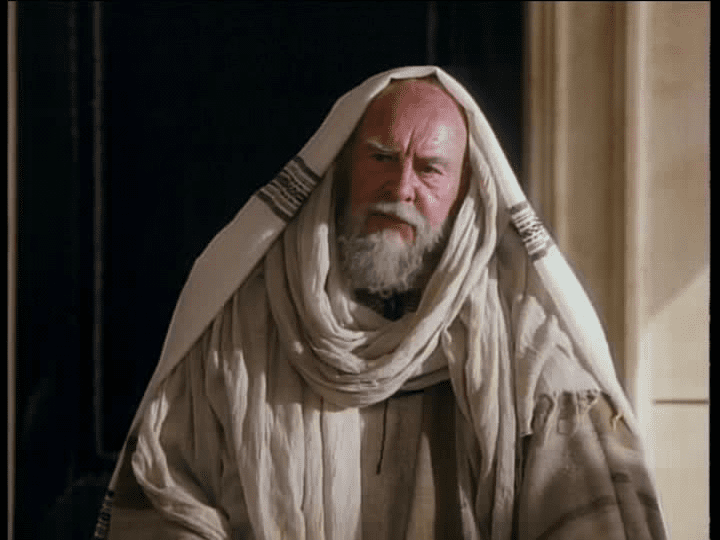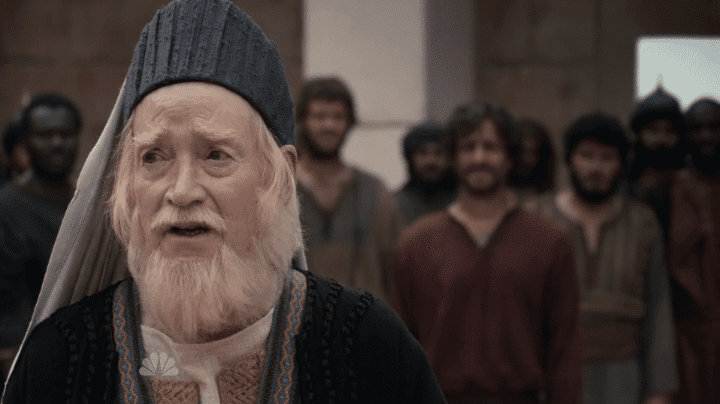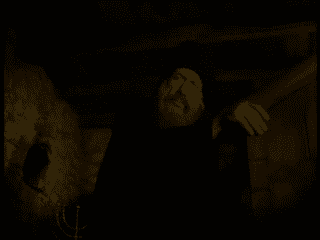Yesterday was the day when Eastern Orthodox Christians remember Gamaliel, the Jewish leader who defended the apostles before the Sanhedrin in Acts 5. So I thought it might be fun to take a quick look at how Gamaliel has been portrayed in film.
The book of Acts tells us two things about Gamaliel: one, that he preached tolerance of the Christians, and two, that Saul (aka Paul), who was one of the first great persecutors of the Church, studied under him. Saul and Gamaliel don’t share any “scenes” together in the Bible, but this contrast, between the tolerant teacher and his intolerant student, has understandably fascinated some screenwriters.
By far the most thoroughly developed interpretation of Gamaliel in any film that I can think of is the one in the 1985 miniseries A.D. Anno Domini.
The first time we see him, Gamaliel (played by John Houseman, an Oscar winner for 1973’s The Paper Chase) is leading a discussion between Sadducees, Pharisees, Zealots, and so on. (His students include Saul, a Pharisee, and Stephen, a Hellenist.) The idea that these schools of thought all co-existed in an actual school is not very likely historically, but the scene does allow the filmmakers to explore the diversity of first-century Judaism, and it also establishes Gamaliel as a wise teacher who is respected by everyone.
Most of his subsequent scenes show him arguing with members of the Sanhedrin, all of whom respect him but many of whom disagree with him — especially when he preaches tolerance for the early Christian sect. Through Gamaliel, who firmly rejects the messianic claims about Jesus but acknowledges the good that his followers do, the filmmakers establish that it is possible to be a non-Christian Jew without being anti-Christian.
Interestingly, Gamaliel is a respected figure within rabbinic Judaism too, and the one scene of his in A.D. Anno Domini that is taken from the book of Acts incorporates a relevant detail from the Talmudic tradition. Here is a transcript of that scene, which begins with Peter and the other apostles being tried before the Sanhedrin:
Gamaliel: It is necessary to state — and to state emphatically — that the aims of the Zealots and those of the Nazarenes are utterly opposed. The Zealots are concerned with inflaming the hearts of the people, and shouting need of insurrection. The followers of the man Jesus seek to cultivate charity for all. A beautiful dream.
Caiaphas: These imposing words cannot hide a dangerous reality, Rabban Gamaliel. Doctrinally, the Zealots are still inside the Law. Doctrinally, the followers of Jesus preach heresy. They have gone outside the Law. They practice blasphemy.
Gamaliel: Healing the sick, for instance?
Priest #1: Rabban Gamaliel is right. We must wait before judging them!
Caiaphas: Whether they heal the sick or not is hardly the point. They breed superstition. There are those who seek to have their ailments cured by standing in the shadow of the man Peter, a common fisherman. (to Peter) You have filled the synagogues with your blasphemy. What do you say?
Peter: This, Caiaphas: We must obey God rather than men. The God of our fathers raised up Jesus who died on the cross and after three days was resurrected from death.
Sanhedrin: (lots of shouting)
Gamaliel: The belief in resurrection has its roots deep in our traditions. Remember the prophet Isaiah: “Fresh lives shall they have, Lord, that are thine in death. Lost to us, they shall live in thee. Awake and utter your praises, you that dwell in dust.”
Peter: God exalted Jesus at his right hand to be a prince and a saviour, to give repentance to Israel and the remission of sins. We are witnesses of these things!
Caiaphas: Such blasphemy! You put yourself in peril of death!
Peter: Death, as you call it, is in the hands of the Romans. Are you ready to give them more victims for their crosses?
Caiaphas: That you challenge the authority of the Sanhedrin, which is answerable to the occupying power!
Sanhedrin: (more shouting)
Gamaliel: May I be heard! Men of Israel, take heed. Do nothing you will regret. What I say is this: Leave these men alone. For if their counsel and their work is of human origin, it will collapse. But if it is from the Lord, you cannot overthrow it, and you risk finding yourselves at war with God.
Priest #2: God is not with them!
Sanhedrin: (more shouting)
Caiaphas: (to Peter and the other apostles) You are hereby charged to speak no more in the name of the man Jesus. Let them be warned by the punishment of the whipping, and then let them be gone.
Roughly half of that dialogue comes from Acts 5; most of the rest of it is dramatic embellishment. But the fact that Gamaliel quotes Isaiah in defense of the resurrection actually has a precedent in the Babylonian Talmud, which states:
Sectarians asked Rabban Gamaliel: Whence do we know that the Holy One, blessed be He, will resurrect the dead? He answered them from the Torah, the Prophets, and the Hagiographa, yet they did not accept it [as conclusive proof]. ‘From the Torah’: for it is written, And the Lord said unto Moses, Behold, thou shalt sleep with thy fathers and rise up [again]. ‘But perhaps,’ said they to him, ‘[the verse reads], and the people will rise up?’ ‘From the prophets’: as it is written, Thy dead men shall live, together with my dead body shall they arise. Awake and sing, ye that dwell in the dust: for thy dew is as the dew of herbs, and the earth shall cast out its dead. . . .
The last passage quoted in that excerpt from the Talmud is taken from Isaiah 26, and it’s the very same passage Gamaliel quotes in the Acts 5 scene in A.D.
Now, it turns out that the Gamaliel referenced in this part of the Talmud might not be identical to the Gamaliel who is mentioned in the book of Acts. The Gamaliel in Acts is known to scholars as “Gamaliel I” while the Gamaliel in this part of the Talmud is thought to be his grandson, a man known to scholars as “Gamaliel II”.
Either way, though, it appears the writers of A.D. did their homework and found a way to bring the Jewish and Christian traditions together in this scene.
After this scene, there are others in which Gamaliel protests the stoning of Stephen and argues against Saul’s persecution of the Christians in Jerusalem.
In his last scene, if memory serves, he expresses regret that Saul is being sent to Damascus to persecute the Christians there. I don’t believe A.D. ever shows Gamaliel’s reaction to Saul’s conversion. When Saul returns to Jerusalem to meet the apostles, he never meets with his former teacher, as far as this miniseries is concerned.
Paul the Apostle, produced in 2000 as part of the Lux Vide ‘Bible Collection’, also expands Gamaliel’s role in the story somewhat — it even keeps him involved in the story after Saul’s conversion — but instead of emphasizing how Jews of all stripes respected Gamaliel, it emphasizes how the Sadducees disagreed with Pharisees like Gamaliel (who is played here by Franco Nero, the original Django).
Here, for example, is how this film’s version of the Acts 5 scene begins:
High Priest: Yesterday, three thousand more were baptized in a matter of hours. We have a new heresy to deal with!
Gamaliel: Heresy? Are you sure?
High Priest: Their leader was crucified by the Romans.
Gamaliel: So now the Romans decide what is heresy?
Reuben: This morning the Romans issue a formal complaint. They fear a rebellion if these teachings persist. So you Pharisees must get control of these people.
Gamaliel: We Pharisees? Why blame us, Reuben?
Reuben: Who teaches that the Messiah is coming? Pharisees! And now they teach that the Messiah is risen from the dead! This Pharisee teaching — this fantasy of an afterlife. You restrain this sect of yours, or Rome will make us suffer.
Gamaliel: Our teaching is clear. At the end of time, we shall all rise again.
Reuben: But the Torah does not teach that. The Torah is the Law as given by God to Moses on Sinai.
Gamaliel: You speak the teachings of Sadducees. But to Pharisees, the Torah was given by God to every man. It is up to each man to decide how to interpret these words for himself.
Reuben: You delude the people with the promise of resurrection, and this is what you get! A risen messiah!
Gamaliel then replies by launching into his famous defense of the Christians.
In a later scene, Reuben sees Stephen preaching in the temple, so he openly challenges Stephen and — seeing Saul and Gamaliel standing off to the side — he walks up to them and asks, “Gamaliel, is that what the Pharisees teach? A man-god?” Gamaliel, who does not want to participate in Reuben’s condemnation of the Christians but also doesn’t want to associate himself with Christian belief in Jesus, replies softly, “You know it’s not.” Unlike the Gamaliel of A.D., who was respected (if not always heeded) by all the other Jews, the Gamaliel of this film can be cornered in a debate.
Possibly unique among films based on Acts, Paul the Apostle also shows Gamaliel after Paul’s conversion, in a few brief scenes where he defends Paul from Reuben and the Romans. It is also Gamaliel who advises Paul to tone down his rhetoric — helpfully rather than accusingly — when Paul lashes out against the high priest a la Acts 23.
Most other portrayals of Gamaliel in Acts-themed films have been a lot more brief.
For example, earlier this year, he appeared in two episodes of A.D. The Bible Continues: once to defend the apostles before the Sanhedrin, and once to talk to Saul as Saul embarks on his persecution of the Church — though he does not oppose Saul’s actions as explicitly as he opposed the Sanhedrin’s.
Similarly, Gamaliel appears in just one scene in the 1981 miniseries Peter and Paul, where he is played by Jose Ferrer — and in this scene, which takes place just before Saul (Anthony Hopkins) goes to Damascus to persecute the Christians there, Gamaliel gives Saul the advice that he gave the Sanhedrin in Acts 5:
Saul: I must go against them.
Gamaliel: But against whom? We are occupied by Rome, not by followers of Jesus. Rome, whose force is overwhelming, corrupts our leaders, subverts from within, and throws us into bitter opposition against each other until we see threats and act against them more in passion than reason. And Jews, in the name of salvation, turn against Jews.
Saul: They would destroy the temple, would they not? It is against them that I turn, not the Jews.
Gamaliel: What are they, if not Jews?
Saul: (turns to leave) Rabban Gamaliel.
Gamaliel: Saul Paulus, be cautious in deciding what you do with these men. Leave them alone. If this idea of theirs or its execution is of human origin, it will collapse. But if it comes from God, you will never be able to put them down, and you risk finding yourself at war with God.
Once again, you can see how the film uses Gamaliel to underscore the Jewish roots of Christianity and the larger threat posed by the Romans, who are only alluded to in Acts 5. (The biblical Gamaliel talks about how the revolutionaries Theudas and Judas the Galilean were “killed”, but he doesn’t say by who. He didn’t need to.)
Despite the fact that he is never mentioned in the gospels, Gamaliel has also appeared in a few films set during the ministry of Jesus — though the only examples that come to mind right now are very different from the usual Hollywood productions.
In the Iranian film Jesus, the Spirit of God, which tells a Muslim version of the story of Jesus, Gamaliel basically does what he does in Acts: he advises his fellow Jews to leave the Jesus movement alone, lest they find themselves opposing God.

More bizarrely, he also appears in Color of the Cross, a film that imagines Jesus was black — and instead of being the voice of tolerance that he is in Acts, the Gamaliel of this film says it is “blasphemy” to call a black man the messiah.
Gamaliel has appeared in other films as well, but these are the first ones that come to mind. If I missed any other worthy examples, please let me know in the comments.


















